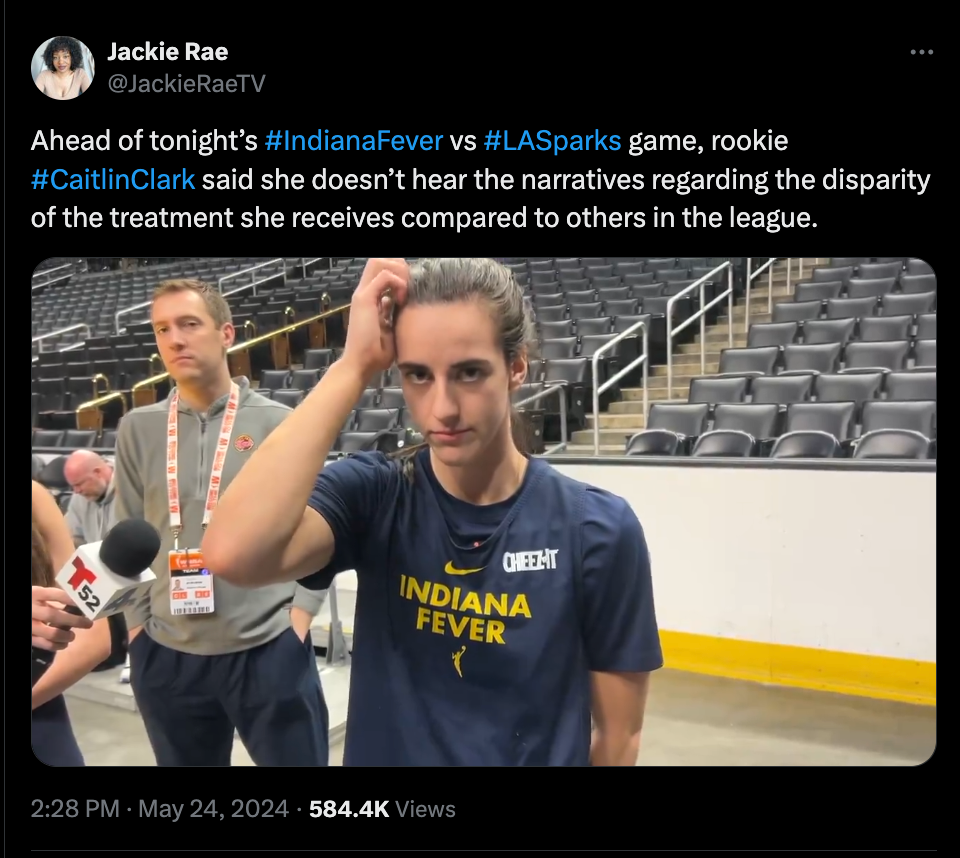Caitlin Clark's Instant Fame Highlights Racial Disparities, But She Isn't to Blame
- Jackie Rae

- May 24, 2024
- 4 min read

Let's take inventory for a moment, shall we? A'ja Wilson is a two-time WNBA champion, an Olympic gold medalist, a finals MVP, a two-time league MVP, a two-time defensive player of the year, and a best-selling author. And—the cherry on top—she is stunningly beautiful with a leading lady personality.
There is no world imaginable where Wilson should not be the face of the WNBA. Yet, that is precisely the world we live in. Unless you've lived in the United States for only 15 minutes or are determined to ignore the obvious, you should not be astonished that a non-melanated woman with zero championships, who hasn't made the winless Fever relevant, has become the face of the WNBA.
For years, there have been conversations about why Black women have struggled to get the focus within the league that their play on the court deserves. Some can overlook this detail, as the league as a whole has struggled to gain notoriety with sports fans.
For those paying attention, Clark's instant fame diminishes the achievements and contributions of current professional players who have worked hard to elevate the league, specifically women of color. But let's be clear — this is not the house that Clark built. This is the house she walked into, and it's not fair to hold her fully responsible for the disparities we are currently seeing.
Caitlin Clark's solo reign at the top of the W-mountain clearly shows how race still influences who receives credit and accolades.
I have no intention of ignoring the truth, but should Clark, a young 22-year-old woman, receive backlash because of the longstanding racism that has plagued our country? I would argue absolutely not, but I fully understand why she is.
We've seen videos dating back to when Clark was a child, too young to know what the words privilege and racism mean. She was just a happy and competitive kid who wanted to win. From the outside looking in, she has never lost that desire to be the best and reach the top.
Sure, at times, she may get a little too vocal with the ref and talk trash to other teams, but that is part of the game. It's what the fans love to see and makes for good television.
Yet, when Angel Reese, who sent Clark home and won the NCAA women's basketball championship, behaves in the exact same way and is shunned for it, people should notice. People should demand that the media be fair and equal not only in the questions they ask but also in their treatment of each player.
Reese gracefully answered every question regarding Clark and defended herself when being painted as the villain. However, she shouldn't have to, especially when Clark has been completely sheltered and has never faced any backlash for her on-court antics.
Again, that is not Clark's fault. So, while I can say Clark has yet to prove she is worthy of the professional shine she has received thus far, I don't think she should shoulder all the blame for the league, media, and fans focusing most of their attention on the star rookie.
But she should shoulder some. My personal belief when it comes to any injustice is that silence makes you complicit. Before the tipoff of the Fever's game against the LA Sparks at Crypto Arena, I asked Clark if she hears the narratives around the attention she receives versus others in the league and how she focuses on the game despite that. Her response: "To be honest, I'm not really on social media; I don't read that."
She went on to say, "This is my job. My job is to compete and play basketball every single day. I think the more attention we can get on every team around this league, that's only going to help it get better and better."
That statement is problamatic. Social media or not, Clark, her family, friends, and teammates can’t possibly be oblivious to the disparity in the treatment she is receiving in comparison to those who have earned the shine are not. Obviously we can’t know what is in their minds, but it would take a tremendous amount of effort to avoid something so blatantly obvious, so if you don't buy this statement, I understand.
As a Black woman, I don't believe we should expect people who benefit from racial inequities to be allies and raise their voices against them. As much as we would love to hear Clark say something like, "Of course I see the disparity, and it sucks," what would be the benefit for Clark to point that out?
Did Breanna Stewart mention that A'ja Wilson should have received a signature shoe long ago? Yes, she did. Did NFL legend Tom Brady sing her praises? Of course. Becky Hammond has been on Team Wilson from day one.
My point is that those who are angry about the attention Clark is receiving given the history we've seen before have every right to be. I understand those who have disdain for Clark because of her silence. But people should stop looking for allies where they do not exist.
Not everyone will go out of their way to push the needle towards equality. Nor should we want those who see no issues to pretend as though they do. Clark has done nothing wrong; let's not treat her like she has.
Fans who see things in Black and white should stop being upset about Clark's shine, whether deserved or not, and instead do more to address the disparities they see. If players in the league deserve more shine, then let's all collectively grab our spotlights and give it to them.




Comments